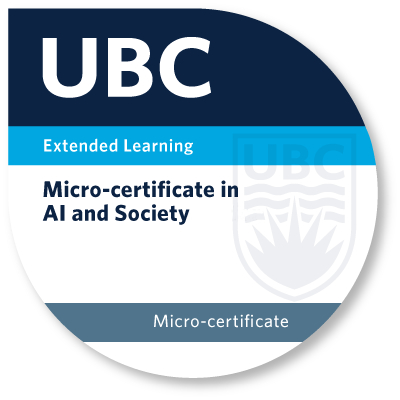- Online
- $1,950
This course can be applied toward the UBC Micro-certificate in AI and Society: Ethics and Impact, and the UBC Certificates in Digital Media or Cloud and Technology Transformation.
Fundamental concepts in artificial intelligence (AI) and ethics are covered in this course, with emphasis on transferable knowledge and critical thinking skills for immediate application in your current work.
An accessible introduction to AI, exploring its wide-ranging applications and diverse perspectives on its benefits, societal impacts and ethical implications. Grapple with the potential opportunities and challenges of AI technologies and their influence in our daily lives.
Examine issues of accessibility, equity and biased data in the development and deployment of AI and the role of governance and ethical standards in addressing these issues. Learn how AI applications can be used for personal learning and sharpen your problem-solving skills as you consider how AI can contribute to the common good.
By the end of the course, you'll be able to:
- Understand the fundamentals of AI, including how it’s developed and tested, the complexity in defining it and the scope of current AI technologies
- Develop an informed opinion about AI based on the latest research, evidence, expert perspectives and theoretical concepts
- Describe the types of AI technology people interact with in their daily lives
- Identify the opportunities and challenges AI presents for society, including its impact on work
- Assess and address ethical concerns that can arise in the development and use of AI
- Consider how AI can be leveraged to address or improve societal problems
- Apply AI to learn more about topics of personal interest
- Identify and use generative AI problem-solving applications ethically
No technical or coding skills required. This course uses practical “no code” platforms to help students build solid AI tool logic and the practical skills for implementation. Platform and tool selection varies and is regularly updated to reflect current industry trends.
Course outline
Week 1: Welcome to the course
- Examples of AI
- AI dilemmas
Week 2: Defining AI
- Human and machine intelligence
- Agency
Week 3: AI in everyday life
- Classification models
- Image recognition
Week 4: AI and access
- Ethical principles
- AI and the labour market
Week 5: Generative AI and personal learning
- ChatGPT
- Personalized learning (fuzzy logic, knowledge graphs)
Week 6: Ethical AI and a global outlook
- Socio-technical impacts
- Cultural dimensions
Week 7 & 8: Ethical impact assessment capstone assignment
- Reviewing an ethical matrix
- Choosing AI to evaluate
Week 8: Capstone due
- Presentation and peer review
How am I assessed?
You're assessed on successfully completing weekly activities, including your contributions to discussion posts and applied case study projects (based on real-life scenarios). These activities are marked using a proficiency scale, and your instructor provides you informal feedback in the live sessions.
While you're not assessed on your attendance of the live sessions, we encourage you to attend these classes, so you don't miss the opportunity to learn and interact with your instructor and other participants. All sessions are recorded in case you miss one.
Expected effort
Expect to spend approximately 5-7 hours per week completing all learning activities, including attending online live sessions.
Technology requirements
All course content is provided in the online courses. To take this program, you'll need access to:
- an email account
- a computer, laptop or tablet, using Windows or macOS
- the latest version of a web browser (or previous major version release)
- a reliable internet connection
- a video camera and microphone
Course format
This part-time, 100% online course consists of instructor-supported real-time classes that allow for a high degree of personal engagement and interactivity, with subject matter experts available during each weekly virtual evening session (PST). These virtual classes are also recorded for later viewing. Each week, learners will review readings and videos, and apply their knowledge in exercises and case studies, and contribute to a discussion forum and connect with other students.
